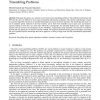Free Online Productivity Tools
i2Speak
i2Symbol
i2OCR
iTex2Img
iWeb2Print
iWeb2Shot
i2Type
iPdf2Split
iPdf2Merge
i2Bopomofo
i2Arabic
i2Style
i2Image
i2PDF
iLatex2Rtf
Sci2ools
115
click to vote
KES
2008
Springer
2008
Springer
Knowledge-based genetic algorithm for university course timetabling problems
This paper discusses a new solution to university course timetabling problems. The problems that belong to the NP-hard class are very difficult to solve using conventional optimization techniques. Our solution methodology is based on a genetic algorithm which uses an installed knowledge base and an infection operation. The knowledge base here is a set of candidate partial solutions of the final solution, and is built from timetables used in past years and teachers' requests relating to how they can work more efficiently. Consequently, the timetable obtained may satisfy teachers' requests and can preserve the advantages of past timetables. Experiments using timetables of University of Tsukuba showed that this approach is an effective solution method. The proposed method includes general techniques concerning the use of problem-specific knowledge that can be applied to a variety of large-scale real-life combinatorial optimization problems.
Conventional Optimization Techniques | Information Technology | KES 2008 | Knowledge Base | Solution |
Related Content
| Added | 13 Dec 2010 |
| Updated | 13 Dec 2010 |
| Type | Journal |
| Year | 2008 |
| Where | KES |
| Authors | Hitoshi Kanoh, Yuusuke Sakamoto |
Comments (0)

